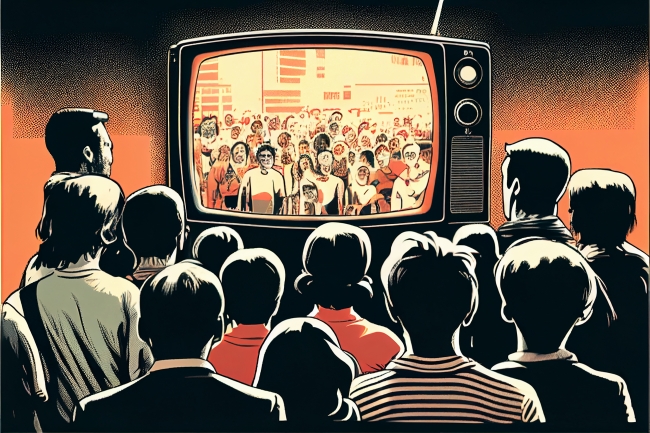From: https://www.gse.upenn.edu/news/educators-playbook/6-tips-explaining-war-children
6 tips for explaining war to children
October 10, 2023
Image: Lazy_Bear/Adobe Stock
In an ever-changing world, parents and educators are too often faced with explaining complex and challenging events to children. And perhaps nothing is more difficult to explain than violence, particularly war and armed conflict.
Navigating those conversations is hard – but not impossible, says Marsha Richardson, Director of Penn GSE’s School and Mental Health Counseling Program.
She explains that adults must help bridge the gap, offering support and understanding as school-age children navigate and process world events in a healthy and constructive way.
“When it comes to issues like (war), sometimes we can find it hard to connect the dots between a child’s behavior and the events unfolding in the world around them,” explains Richardson. “This is about being in tune with and understanding, developmentally, the ways in which these stressful situations might manifest for children.”
To help you prepare, Richardson offers the following tips:
First, do some self-reflection
Before trying to talk a child through this, take the time to self-reflect on your emotional state and your political, moral and religious views. Consider that these will influence how you respond to the situation, conversation, and questions a child might have. Doing this ahead of time helps you avoid figuring it out for yourself in front of them, which is very important to younger children. Parents, in particular, should strive to remember they are the model for their child's emotional regulation.
Keep the child’s age in mind
When dealing with conversations around such complex situations, it's easy to forget the age of your audience. As you approach talking about the war with a child, consider their age and developmental stage — and respond to their questions and comments accordingly. To use an ongoing conflict example, an age-appropriate response for elementary school students about why Russia and Ukraine are fighting could be, "They are fighting to figure out who's in charge of the country." The response to that question for an older child could be, "They are fighting to gain power over a country that has a unique position in world politics."
Remember, too, that the child's age could determine the nature of their concerns. For example, younger children may focus more on safety and security issues, primarily for themselves and their loved ones. At the same time, middle schoolers may be more focused on factual information, and high schoolers will have begun assimilating the values of caregivers, school, peers and media. With a younger child, you may need to reassure them that you and their country are ensuring their safety. With a middle-schooler, you can provide accurate information and engage in further research alongside them. With high schoolers, you can help them think critically about what they know, how they obtained that information, and how they might consider the broader context of their role in current or future influence on these issues.
Get out in front of misinformation or biases
For children of all ages, be sure to ask them what they know. Correct any misinformation or negative generalizations they may have — such as “all Russians are bad” in the example cited above — and provide them with the truth and context they need. Convey that those generalizations are particularly hurtful for some of their class- or schoolmates who may be Russian or Ukrainian. Those students, some of whom may still have close family in Russia or Ukraine, may be experiencing heightened anxiety, isolation or even bullying.
Consider limiting news consumption
Parents of younger children should limit their child's access to news coverage of the war. We might not think twice about leaving CNN or another news channel on all day when such significant world events are occurring, but the constant stream of wartime stories, images and sounds can be very overwhelming for a small child. Traumatic videos and photographs of dead bodies and bombings frequently make it to air in these situations. While older children might be better equipped to deal with the shocking imagery of televised war coverage, you should still sit down with them and help them process what they hear and see.
Look for changes in behavior
Caregivers should also pay attention to any regressive behaviors that might manifest, as some children won’t be able to articulate their stress over what’s happening. Things to look for include thumb-sucking, requesting to sleep in your bed, increased tearfulness, a drop in grades or somatic complaints like headaches, stomachaches and sleeplessness. Maintain an open line of communication with your child's school, teachers, and counselors if you suspect behavioral changes are impacting your child's learning and interpersonal relationships. Teachers should similarly be on the lookout for behavioral changes and keep parents apprised of any that might come up.
Don’t be afraid to reach out
Finally, seek support within your personal and professional spheres to help you manage your distress. If you're having trouble processing things emotionally, it's more than likely your children or students are, or will, be impacted.
Marsha Richardson is a distinguished clinical psychologist with a wealth of experience in mental health counseling, particularly concerning school-age children and adolescents impacted by trauma and conflict. As a senior lecturer and the director of Penn GSE’s School and Mental Health Counseling Program, she has been instrumental in developing and overseeing school-based mental health programs. As a renowned and well-respected voice in child and adolescent development, her insights are particularly valuable in the context of international armed conflicts and their impacts on the young generation's mental health and well-being.
An earlier version of this Playbook first ran in February 2022; it has been revised in light of escalating violence in the Middle East.
You May Be Interested In
Related Topics


